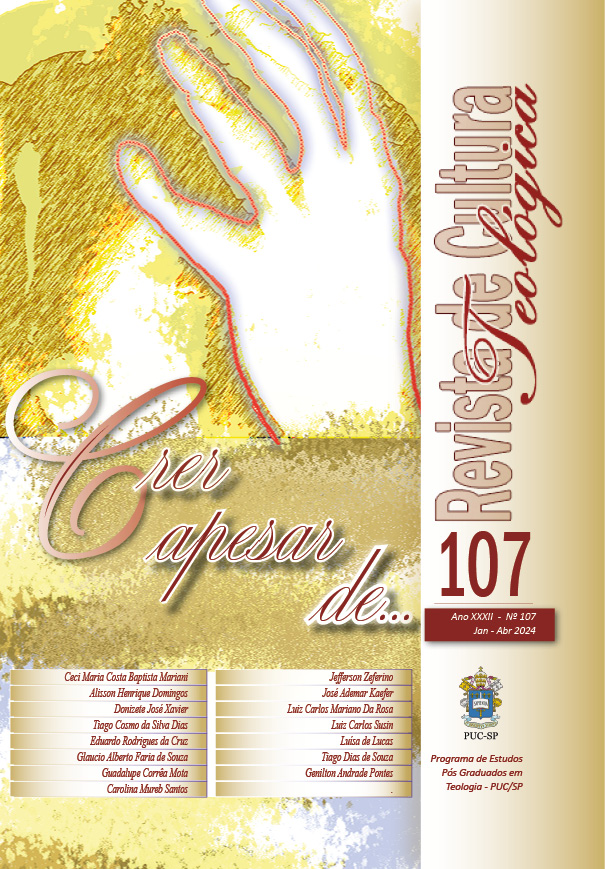Exegetical analysis of Hebrews 6:4-6
DOI:
https://doi.org/10.23925/rct.i107.64610Keywords:
Sin, Fall, Rebellion, Repentance, ForgivenessAbstract
Given the uncertainty about the authorship of the Letter to the Hebrews, it is crucial to analyze its message, regardless of its controversial authorship. The investigation of the Greek terms in Hebrews 6:4-6 and their corresponding Hebrew words reveals an emphasis on the term “ἀδύνατον” (adýnaton) which means “impossible”, emphasizing the impossibility of bringing those who have fallen back to inner transformation. This reflects the seriousness of the aforementioned apostasy, showing that spiritual fall is a continuous threat to faith, as it represents not only an error, but also an active betrayal of Christ and His work. The in-depth analysis of these terms, aided by linguistic and theological resources, enriches the understanding of the passage and highlights the seriousness of the apostasy. Apostasy goes beyond a mere error, representing a profound rupture with faith in Christ and divine truth. Those who turn away from Christ, after receiving His grace, are symbolically crucifying the Son of God again, exposing him to ignominy. This reinforces the idea that apostasy is an active and malicious betrayal, as Jesus' words about blasphemy against the Holy Spirit resonate. In summary, the analysis of theological and linguistic terms in Hebrews 6:4-6 provides a solid basis for a more complete understanding of the nature of apostasy and its implications for Christian faith and practice.
References
ANDREWS, Bíblia de Estudo. Almeida Revista e Atualizada. Tatuí: Casa Publicadora Brasileira, 2015.
BEZERRIL M. C. A queda dos iluminados de Hebreus 6:4-6. Calvino e Mattew Poole. 1-19.
BRANNAN, Rick (Org.). Léxico Lexham do Novo Testamento Grego. Bellingham, WA: Lexham Press, 2020.
CARSON, D.A; MOO, DOUGLAS J; MORRIS, L. Introdução ao Novo Testamento. Tradução de Márcio Loureiro Redondo. São Paulo: Vida Nova, 1997.
COLIJN, Brenda B. A Permanência da Salvação. In Sumário de Teologia Lexham editado por Brannon Ellis, Mark Ward e Jessica Parks. Bellingham, WA: Lexham Press, 2018.
DEDEREN, Raoul (ed.). Tratado de Teologia Adventista do Sétimo Dia. Tatuí: Casa Publicadora Brasileira, 2011.
DEPPE, Dean. The Lexham Clausal Outlines of the Greek New Testament: SBL Edition. Bellingham, WA: Lexham Press, 2011.
EWELL, C. Rosalee Velloso. Carta aos Hebreus In: Comentário Bíblico Latino-Americano. São Paulo: Mundo Cristão, 2022.
FILHO, José Adriano. Exposição e parênese como problema literário-teológico: um estudo da estrutura literária de Hebreus. Reflexus, 2014.
FRITZ, L. Comentário Esperança: carta aos Hebreus. Editora Evangélica Esperança, 2000.
JOHANNES BEHM. Introdução ao novo testamento. Tradução de Isabel Fontes Leal Ferreira, João Paixão Neto, Paulo Feine. São Paulo: Paulus, 2021.
KEENER, Craig S. Comentário histórico-cultural da bíblia: novo testamento. Tradução de José Gabriel Said. São Paulo: Vida Nova, 2017.
KISTEMAKER, S. J. Exposição da Epístola aos Hebreus. Imprensa Evangélica, 1984.
MARIANO, B. R. Origem, natureza e consequências do pecado. Neopentecostais. Edições Loyola, 2016.
NICHOL, Francis D. (ed.). Comentário Bíblico Adventista do Sétimo Dia. v. 7: a Bíblia Sagrada com comentário exegético e expositivo. Tatuí: Casa Publicadora Brasileira, 2015.
OSBORNE, G. R. e Guthrie, G. H. Carta aos Hebreus. Traduzido por Ítalo Cunha. Primeira edição. Comentário Expositivo do Novo Testamento. São Paulo: Editora Carisma, 2022.
PFANDL, Gerhard (org.). Interpretando as Escrituras: descubra o sentido dos textos mais difíceis. Tatuí: Casa Publicadora Brasileira, 2015.
PHILLIPS, Richard D. Estudos Bíblicos Expositivos em Hebreus: como Enfrentar os Desafios e Armadilhas do Mundo Confiando na Supremacia de Cristo. São Paulo: Editora Cultura Cristã, 2018.
SIMON K. Comentário do Novo Testamento. 2. ed. São Paulo, SP: Editora Cultura Cristã, 2013.
TENNEY, M. C. O novo testamento, sua origem e análise. Santo Amaro: Shedd Publicações, 2008.
Published
How to Cite
Issue
Section
License
Copyright (c) 2024 Revista de Cultura Teológica

This work is licensed under a Creative Commons Attribution-NonCommercial-NoDerivatives 4.0 International License.
Os autores concedem à revista todos os direitos autorais referentes aos trabalhos publicados. Os conceitos emitidos em artigos assinados são de absoluta e exclusiva responsabilidade de seus autores.

